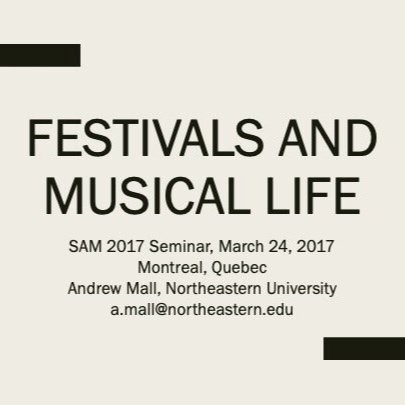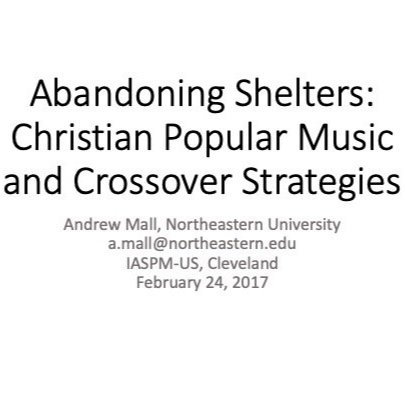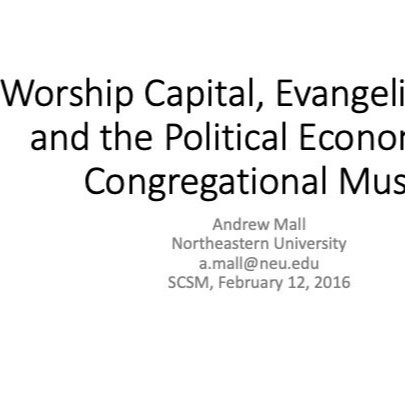
Resistance, Renewal, and Congregation at Christian Music Festivals
AAR conference presentation (2017). Based on interviews with festival staff and attendees, historical research, ethnographic fieldwork at Cornerstone in 2009–2012 (including two summers volunteering as festival staff), and fieldwork at AudioFeed and Wild Goose in 2017, this paper examines the production of space, place, and community at Cornerstone, AudioFeed, and Wild Goose.
The Ethnomusicology of Religion: Fieldwork Methods and Ethics
SEM conference roundtable panelist (2017). Ethnographic fieldwork is often shaped by logistical issues including access, documentation, rapport, and fluency (both cultural and linguistic). Ethnomusicologists researching musics within religious or sacred contexts, however, face additional challenges. For example, moments of spiritual transcendence complicate participant-observation, both for ethnographers who belong to the faith tradition they are researching and for those who do not. Similarly, the varied expectations of the researcher’s audiences problematize documentation and representation. In this roundtable, participants consider these and other issues, addressing the ethical and methodological challenges of fieldwork posed by the ethnomusicology of religion.
Despacito and One Sweet Day: How Pop Culture ‘Reflects the Fabric of Our Society’
News@Northeastern (2017). This month, “Despacito” came precipitously close to being the longest-running No. 1 song on the Billboard Hot 100 chart. Andrew Mall, assistant professor of music industry and ethnomusicology, said that the increasingly heterogeneous listening patterns of an increasingly diverse U.S. population means it’s not surprising Carey held on to the title for so many years. He added that this new, splintered listener base means that more variety is showing up on big charts like the Billboard Hot 100.
Music Industry Co-op Seminar
This directed study is designed specifically for graduate students in the Masters of Science in Music Industry Leadership program who are working on co-op. The course content and activities will help you reflect on the ways in which you are learning, the attitudes and behaviors that influence how you approach professional challenges, the motivators that influence your decision-making, and how this experience relates to your overall career goals. Your overall objective is to gain a deeper and broader understanding of your role’s importance within the music industry. By doing so, you will begin to see interactions and intersections with other professional areas, your academic work, and your prior background and professional work experience.


Festivals and Musical Life
SAM seminar (2017). In this seminar, we examine the multiple ways in which festivals—understood as music communities (or scenes) concentrated into limited temporal and geographic frames—affect musical life in the Americas at the micro and macro levels, both historically and in the ethnographic present. Seminar participants should be prepared to present case studies that investigate and discuss the cultures, histories, values, and spaces developed in music festivals in the Americas.

Abandoning Shelters: Christian Popular Music and Crossover Strategies
IASPM-US conference presentation (2017). In this paper, I critically analyze the strategies of two crossover cases: Amy Grant, who became the first Christian pop singer with a number-one Billboard Hot 100 single following the 1991 release of “Baby, Baby,” and Tooth and Nail Records, a Christian metal and punk label whose artists straddle multiple margins, crossing over from one to another. In doing so, I build upon the works of Hebdige, Toynbee, Weisbard, and others to theorize crossover as a process through which niche markets change over time.

Defining the Mainstream of Music with Professor Andrew Mall
Northeastern’s College of Arts, Media + Design (2016). Andrew Mall, PhD, an Assistant Professor of Music and a coordinator of the MS in Music Industry Leadership program at CAMD, researches the classification and analysis of popular mainstream music, and how it affects his current project around Christian rock.
Historical Traditions: America
In this course, we will survey the musical heritage of the United States in various cultural and stylistic contexts. How has the musical diversity in the U.S. reflected this country’s social and cultural diversity? In what ways has the commercial marketplace affected American musical life? What values have informed the emergence, performance, and consumption of the various genres and styles of art, folk, popular, and sacred musics in the U.S.?


“This is a chance to come together”: Subcultural Resistance and Community at Cornerstone Festival
Congregational Music-Making and Community in a Mediated Age, Ashgate (2015). Based on historical research and ethnographic fieldwork in 2009–2012, including two summers volunteering as festival staff, this chapter examines the ways in which Cornerstone’s imagined community was constructed, manifested, perpetuated, and mourned. This work participates in a growing literature on contemporary Christian congregational music practices and contributes to scholarship in ethnomusicology and popular music studies that address explicitly peripheral musical activities.

Worship Capital, Evangelicalism, and the Political Economy of Congregational Music
SCSM conference presentation (2016). Building upon the works of Pierre Bourdieu, analyses of music industries, and contemporary discourses of intellectual property, this paper outlines a theoretical framework for the political economy of worship music and considers barriers to integrating this framework into our scholarship and practice. This research emerges from several years of ethnographic fieldwork at the Anchor Fellowship, a non-denominational evangelical church in Nashville, Tennessee, and advances the concept of “worship capital” to capture the various ways in which individuals and institutions invest in worship.

Music Festivals as Scenes: Producing Ephemeral Space Annually at Cornerstone Festival
SEM conference presentation (2015). Based on interviews with festival staff, historical research, and ethnographic fieldwork in 2009–2012—including time working on the festival’s setup, stagehand, and teardown crews—this paper examines the production of space and place at Cornerstone Festival. In doing so, it contributes a vital link between scene theory and the growing ethnomusicological literature on festivals.


Studying Worship Capital: Cultural Insiderness, Religious Outsiderness, and Political Economy in Evangelical Worship
Yale ISM Fellows’ Lunch presentation (2015). The presence of capital in Christian worship is unmistakable, enabling individuals and institutions to participate in the production, distribution, mediation, and consumption of worship music. Performing artists, songwriters, and ministers operate in markets that shape the aesthetics of songs that congregations sing every Sunday morning. This worship economy, however, remains undertheorized in congregational music studies.

“We Can Be Renewed”: Resistance, Renewal, and Worship at the Anchor Fellowship
The Spirit of Praise, Penn State University Press (2015). Live music is integral to worship services, where aesthetics of charismatic worship and rock concerts often overlap. This chapter examines the ways in which the Anchor Fellowship’s theology, worship practices, and congregational music are co-constitutive. This work participates in a growing literature on contemporary Christian worship music practices and contributes to scholarship that addresses peripheral musical activities.

Capital, Class, and Congregational Matters: The Political Economy of Worship Music
Christian Congregational Music conference presentation (2015). Building upon the works of Pierre Bourdieu (1984, 1986, 1993), Jacques Attali (1985), and contemporary discourses of intellectual property, how might we consider the ways in which other forms of capital (cultural, intellectual, religious, social, etc.) are implicated in these markets? How do markets mediate between distinct congregations and globalized worship industries? This paper outlines a theoretical framework for the political economy of worship music, considering the roles of capital(s) in its production, distribution, mediation, and consumption.


From the Margins to the Mainstream: Two Crossover Cases
Embracing the Margins symposium presentation (2015). In a critical analysis of two crossover songs, I examine the ways in which ethics and aesthetics are implicated in crossover success—what Jason Toynbee and others have described as “mainstreaming,” and what Dick Hebdige has identified as the dominant culture’s integration of subcultural style via the commodity form. This paper thus moves beyond comparative or categorical definitions of margins and mainstreams to theorize the process of one becoming the other.
Search and navigate extras
- music industries
- festivals
- gamelan
- Boston
- God Rock Inc
- CCM
- Northeastern University
- Christian rock
- panels
- Tufts University
- worship
- congregational music
- Northeastern Global News
- SCM
- record labels
- Nashville
- methods
- ethics
- Chicago
- University of Chicago
- punk
- SEM
- radio
- Taylor Swift
- subculture
- capital
- Furnace Fest
- AMS
- TikTok
- IASPM-US
- hardcore
- sing-alongs
- Amy Grant
- crossover
- introductions
- emo
- vinyl
- TIME
- scene
- AAR
- Beer & Hymns
- MEIEA
- Christianity Today
- DePaul University
- Universal Music Group
- awards
- Future of Pop
- community
- Keith Green
- Ticketmaster